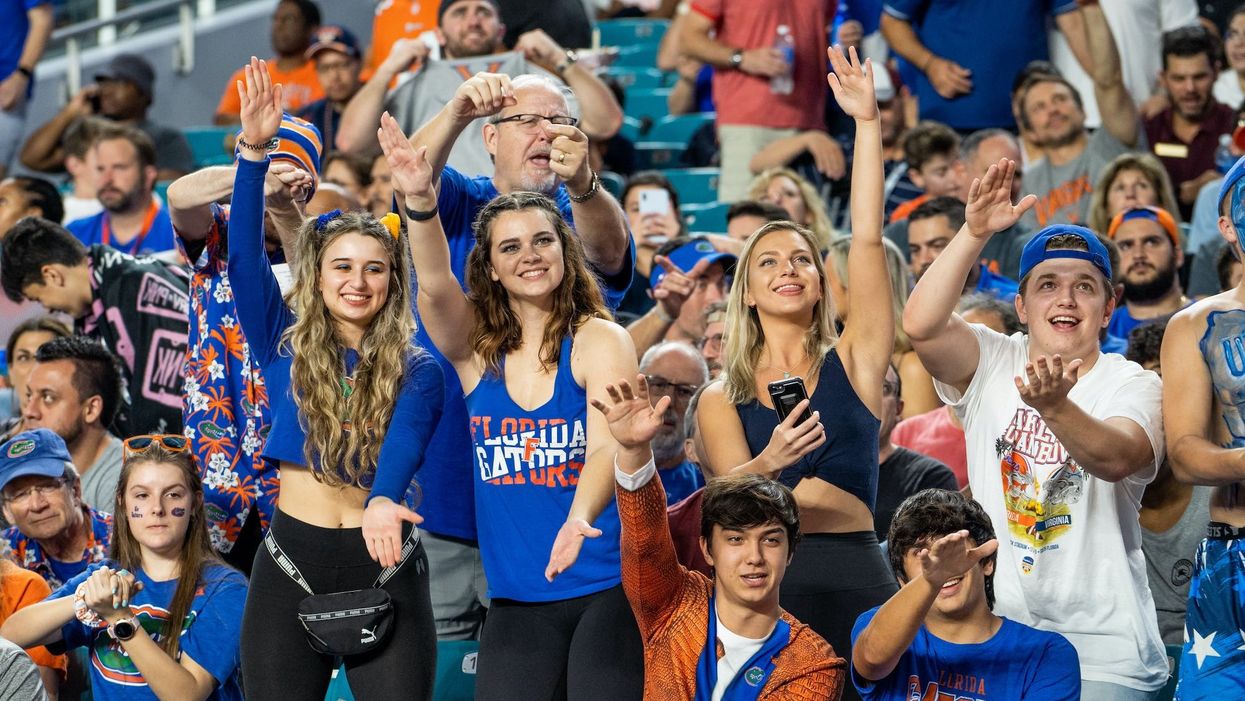
Photo by Aaron Gilbert/Icon Sportswire via Getty Images

The black player who made it popular begs to differ
The University of Florida announced Thursday that it is banning the school's famous "Gator Bait" cheer from all future sporting events, ESPN reported. But the player who made the chant popular is none too thrilled with the school's edict.
For the last 20 to 25 years, "Gator Bait" has been a common chant from gator fans in response to a song played by the school's band. But no more.
According the outlet, school President Kent Fuchs said the cheer will be forbidden because of "history racist imagery associated with the phrase."
Has there been a problem with racism and that cheer at Gator games? Not according to Fuchs.
"While I know of no evidence of racism associated with our 'Gator Bait' cheer at UF sporting events, there is horrific historic racist imagery associated with the phrase," Fuchs said, ESPN reported. "Accordingly, University Athletics and the Gator Band will discontinue the use of the cheer."
According to Ferris State University's Jim Crow Museum of Racist Memorabilia, black babies were used as alligator bait — though it doesn't seem to have been a common practice:
It isn't really a question of whether African American babies were used as alligator bait, but the question is how frequent was the practice?
During slavery and the Jim Crow era in the United States, African Americans were brutalized and mistreated in almost every way imaginable. If there was a way to kill, maim, oppress, or use an African American for any reason, it more than likely happened. If the skin from an African American might be used for leather shoes or handbags, (see Human Leather), then pretty much all atrocities were possible and probable.
African American babies being used as alligator bait really happened, and it happened to real people. It doesn't seem to have been a widespread practice, but it did happen.
The site also gives some specific historical examples:
In 1908 the Washington Times reported that a keeper at the New York Zoological Garden baited "Alligators With Pickaninnies" out of their winter quarters. In the article two "small colored children happened to drift through the reptile house among the throng of visitors" and they were "pressed into service." The alligators "wobbled out as quick as they could after the ebony mites, who darted around the tank just as the pursuing monsters fell with grunts of chagrin into the water." The alligators were "coaxed" into their summer quarters by "plump little Africans" ("Baits Alligators").
The headline in the September 21, 1923 Oakland Tribune reads "PICKANINNY BAIT LURES VORACIOUS 'GATOR TO DEATH. And Mother Gets Her Baby Back in Perfect Condition; Also $2". In the article T.W. Villiers chronicles the entire process of using black babies as bait and how "these little black morsels are more than glad to be led to the 'sacrifice' and do their part in lurking the big Florida gators to their fate without suffering so much as a scratch." Villiers is quick to point out that the babies are brought out of the "water alive and whole and come out wet and laughing" and that "there is nothing terrible about it, except that it is spelling death for the alligators." In a strange twist, Villiers reports on the hunter's attempts to rationalize the motivation of the alligators to "jeopardize every hope of life for a live baby, and in the matter of color, the additional information is vouchsafed that black babies, in the estimation of the alligators, are far more refreshing, as it were, than white ones."
Not according to the black player who made it a thing at UF.
Lawrence Wright, ESPN noted, popularized the phrase, "If you ain't a Gator, ya Gator bait, baby," after a win over Florida State in 1995.
He told the Gainesville Sun he disagrees with the school's decision and would like a word with President Fuchs.
"Me and the president need to sit down and talk about this," Wright said.
"I'm not going for it," he added. "I created something for us. It's a college football thing. It's not a racist thing, It's about us, the Gator Nation. And I'm Black.
"What about our history as the Gator Nation?" the former star cornerback asked. "We took a program from the top five to No. 1 in the country. I think I've done enough, put in the sweat and tears, to get to offer my opinion about something like this."